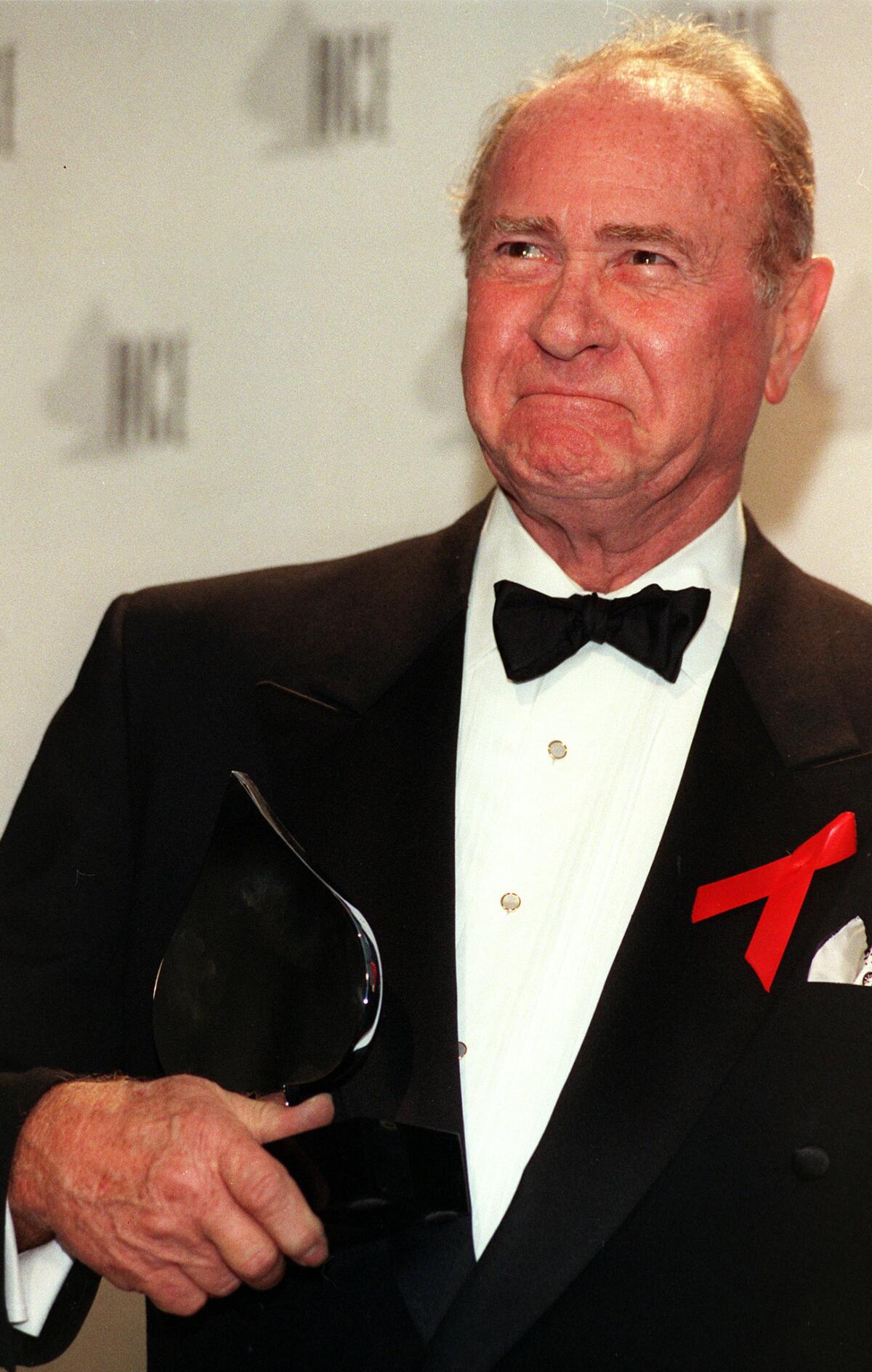Darren McGavin, 83; Prolific Actor in ‘Night Stalker,’ ‘Christmas Story’

- Share via
Darren McGavin, an Emmy-winning actor who worked almost constantly in television for almost 50 years and made an enduring mark on popular culture as the grizzled has-been crime reporter in the 1970s series “Kolchak: The Night Stalker,” has died. He was 83.
McGavin, who also is remembered for portraying the curmudgeonly father in the 1983 film “A Christmas Story,” died of natural causes Saturday at a Los Angeles-area hospital, his family said.
Although he had roots on stage and in film, long-term success came on the small screen, often in the form of gruff-voiced authority figures. One such role -- the opinionated father of Candice Bergen on “Murphy Brown” (CBS, 1988 to 1998) -- earned him an Emmy Award in 1990.
McGavin starred in several TV series, including the syndicated “Mickey Spillane’s Mike Hammer” (1957 to 1959), “Riverboat” (NBC, 1959 to 1961), “The Outsider” (NBC, 1968 to 1969) and the short-lived CBS comedy “Small & Frye” (1983).
He first played fast-talking Carl Kolchak in “The Night Stalker,” a TV movie about a reporter covering a vampire’s killing spree in Las Vegas. When it first aired in 1972, the movie set a ratings record.
“That marvelous hunk of creepy camp of a TV movie,” as The Times called it in 1974, was followed by a 1973 sequel, “The Night Strangler.” The ABC series that seemed to captivate a generation of future sci-fi scriptwriters aired for a single season beginning in 1974.
The “Night Stalker” movies and series have been credited with inspiring contemporary entertainment, including the WB series “Buffy the Vampire Slayer” and the 1997 film “Men in Black.” Writer-producer Chris Carter has often cited Kolchak as the primary inspiration for the long-running fantasy-drama “The X-Files” that first aired on Fox in 1993.
“The Night Stalker’s” combination of fear and fun worked in large part because of the “jauntiness in the face of doom” that McGavin brought to what he called “the role of a lifetime,” Frank Spotnitz, a producer of a short-lived revival of the series that aired on ABC last fall, wrote in Entertainment Weekly in 2005.
By the time the 20th episode of the original series had aired, ABC had granted McGavin’s pleas to put him -- and the low-rated series -- out of their misery.
Despite treasuring the part, McGavin knew that the high-concept idea of chasing after supernatural monsters of the week as a way of breaking into the big leagues of journalism wouldn’t work over the long haul.
Ever outspoken, McGavin criticized television for creating “cardboard characters,” he told The Times in 1968, and he pointed the finger at his private-eye detective series “Mike Hammer,” so violent that TV Guide once called it “easily the worst show on TV.”
“Hammer was a dummy. I made 72 of those shows and thought it was a comedy,” McGavin recalled. “In fact, I played it camp. He was the kind of guy who’d have waved the flag for George Wallace.”
After leaving behind the character who was known for either kissing or killing the women, McGavin co-starred with Burt Reynolds as a skipper in “Riverboat,” set in the 1840s.
That was another series, McGavin said, that could use a reality check.
“We’d dock in New Orleans ... and there’d never be a Negro in sight. That’s when the series started to crumble,” he said in 1968.
On the big screen, McGavin first received notice in two 1955 films for portraying a young artist in Venice in David Lean’s “Summertime” and Frank Sinatra’s drug supplier in Otto Preminger’s “The Man With The Golden Arm.” He also was Jerry Lewis’ parole officer in “The Delicate Delinquent” (1957) and a gambler in 1984’s “The Natural.”
He starred alongside Don Knotts, who died Friday, in the 1976 family comedy “No Deposit, No Return.”
In “A Christmas Story,” McGavin played the narrator’s father who grumbles his fair share of profanity. Years later, he demonstrated the art of garbled cussing on “Larry King Live” on CNN.
Other memorable roles included playing Gen. George Patton in the 1979 miniseries “Ike,” and appearing alongside Rock Hudson in the sci-fi miniseries “The Martian Chronicles.”
He was born May 7, 1922, to Reid Delano Richardson and Grace Bogart McGavin in Spokane, Wash., although some sources give his birthplace as San Joaquin, Calif.
McGavin never revealed much about his childhood, but he told TV Guide in 1973 that he was a constant runaway by 10, and as a teen he lived in warehouses in Tacoma, Wash. His parents vanished, he said.
After attending College of the Pacific in Stockton for a year, McGavin dropped out and moved to New York. He studied acting at the Neighborhood Playhouse under the legendary Sanford Meisner and at the Actors Studio.
In New York and on the road, he portrayed Happy, the second son of Willy Loman in “Death of a Salesman.” He spent more than a dozen years performing on Broadway, beginning in 1953, including appearing in “The Rainmaker.”
McGavin liked to portray his early film career as something he pulled over on Hollywood. While painting a set for “A Song to Remember” at Columbia, he learned about a small role in the 1945 film that still needed to be cast.
After cleaning up, he walked back in the front gate with his agent and the director, Charles Vidor, hired him.
Only the paint foreman recognized him and said, “You’re fired.”
Survivors include his four children -- Bogart, Bridget, Megan and York -- from his first marriage, which ended in divorce. His second wife, the actress Kathie Browne McGavin, died in 2003.
More to Read
Start your day right
Sign up for Essential California for the L.A. Times biggest news, features and recommendations in your inbox six days a week.
You may occasionally receive promotional content from the Los Angeles Times.







